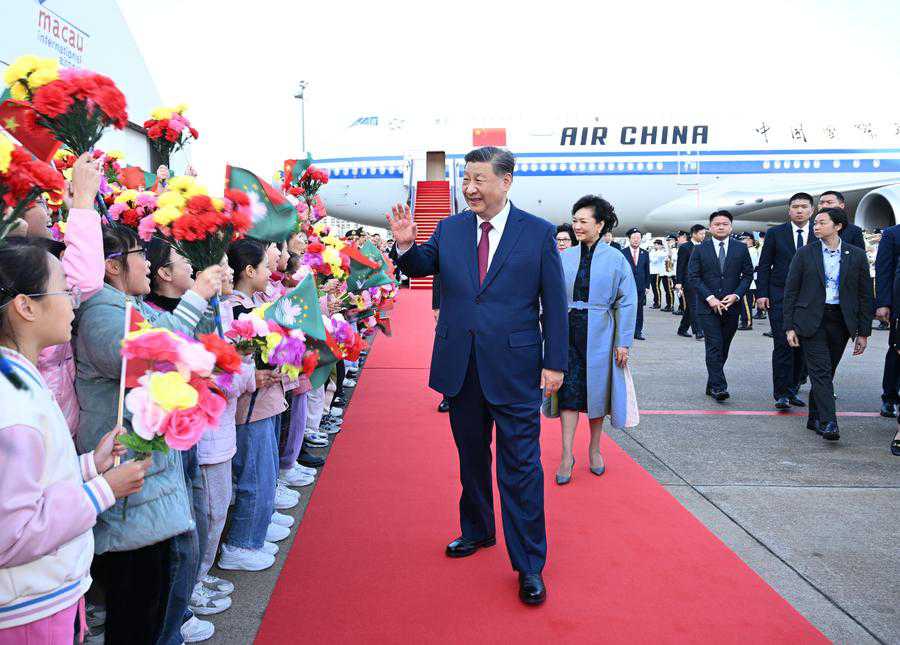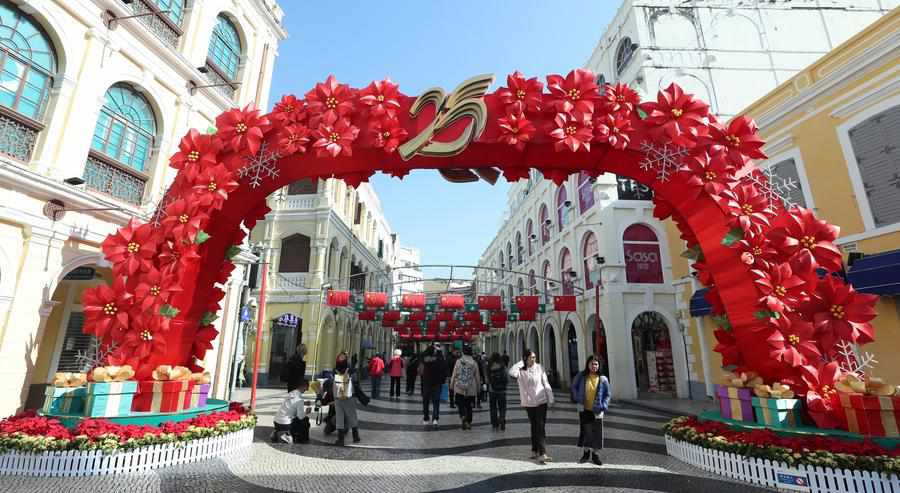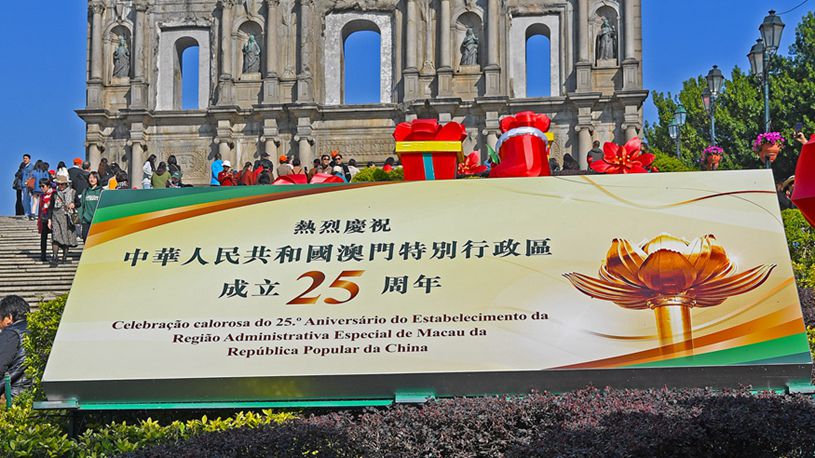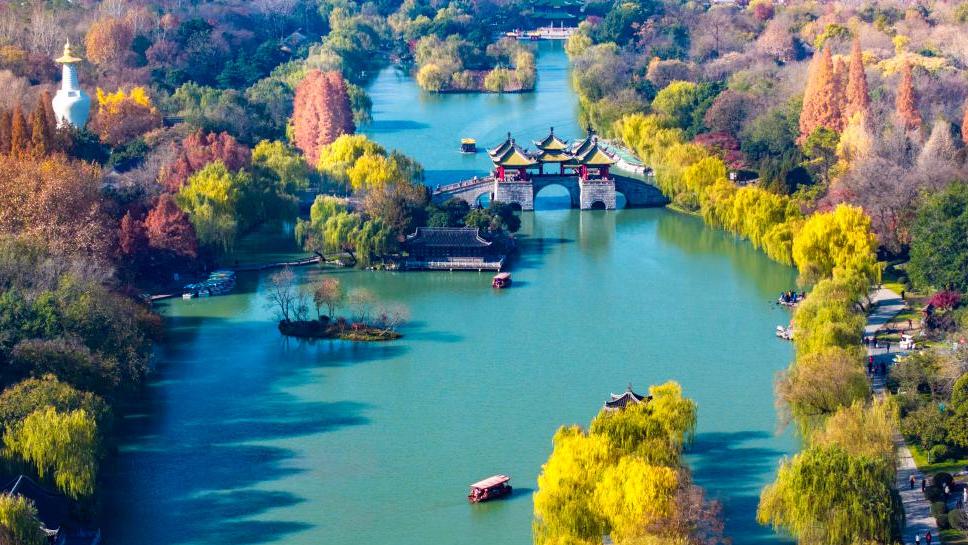Leading Macao to greater success of "one country, two systems"
MACAO, Dec. 18 (Xinhua) -- In 2012, shortly after becoming general secretary of the Communist Party of China Central Committee, Xi Jinping visited Guangdong Province in southern China. One stop on this trip was Hengqin, a place that was not so well-known back then but has since gained much spotlight.
Hengqin is an island in the city of Zhuhai, adjacent to Macao. Xi urged exploring innovative cooperation models between Hengqin and Macao to contribute to the latter's long-term prosperity and stability.
Macao's development has long been on Xi's mind. In 2009, then as vice president of China, he visited Macao and announced the plan to develop Hengqin, highlighting its potential to bolster Macao's economic diversification.
On Wednesday afternoon, Xi, also Chinese president and chairman of the Central Military Commission, arrived in Macao to attend celebrations for the 25th anniversary of Macao's return to the motherland. Delivering a brief speech at the airport, Xi called Macao "a pearl on the palm" of the motherland.
Over the past 25 years, the practice of "one country, two systems" with Macao characteristics has achieved success widely recognized by the world, showcasing great vitality and unique charm, he said.
The strategic vision Xi outlined for the city's growth, along with his commitment to improving the livelihoods of the local people, has been pivotal to Macao's transformation into a thriving economic hub and a desired tourist and leisure destination. Its development has been a success story of "one country, two systems."
Since the return from Portuguese rule in 1999, Macao has been governed as a special administrative region (SAR) under the "one country, two systems" policy -- a unique arrangement that allows it to maintain its capitalist system and way of life within socialist China.
Over the years, Macao's GDP had grown from 51.9 billion patacas (about 6.23 billion U.S. dollars) in 1999 to 379.5 billion patacas in 2023, while the per capita GDP had more than quadrupled to around 70,000 U.S. dollars. This year, Forbes magazine listed Macao as the second-richest place in the world, trailing only Luxembourg.
The annual number of visitors to the city has also surged to more than 32 million from 7 million 25 years ago.

Chinese President Xi Jinping, also general secretary of the Communist Party of China Central Committee and chairman of the Central Military Commission, and his wife Peng Liyuan greet the welcoming crowd in Macao, south China, Dec. 18, 2024. (Xinhua/Xie Huanchi)
PLANNING MACAO'S DEVELOPMENT
The Chinese central government has taken into full consideration Macao's unique position and role, encouraging it to actively integrate into the national development strategy.
For Hong Kong and Macao, "one country, two systems" is the biggest strength; China's reform and opening up has set the broadest stage for their development; and the implementation of the Belt and Road Initiative (BRI) and the development of the Guangdong-Hong Kong-Macao Greater Bay Area present new and significant opportunities, Xi has said.
The Guangdong-Macao In-Depth Cooperation Zone in Hengqin, established in 2021 under Xi's personal planning and guidance, has enabled Macao to develop industries such as high-end manufacturing, traditional Chinese medicine, financial services, and cultural tourism, helping to reduce its overdependence on the gaming sector.
As of September 2024, the cooperation zone has attracted 6,461 Macao enterprises and 16,539 Macao residents to move in. The deeply-integrated development between Guangdong and Macao is becoming a reality.
Xi regards the joint development of Hengqin by Zhuhai and Macao as a key component of the Guangdong-Hong Kong-Macao Greater Bay Area's growth. As part of this major national strategy, Macao was designated as one of the four central cities in the Greater Bay Area, alongside Hong Kong, Guangzhou, and Shenzhen, serving as an engine for regional development. This has provided Macao with new opportunities, motivation, and space for growth.
Infrastructure construction has gathered speed. On Oct. 23, 2018, the Hong Kong-Zhuhai-Macao Bridge, the world's longest sea-crossing bridge, was opened, with Xi personally announcing its inauguration.
Over the past six years, the bridge has evolved into a key economic and trade channel and a vital logistics artery in the Greater Bay Area. The annual number of border crossings at the Hong Kong-Zhuhai-Macao Bridge Port and the Hengqin Port both exceeded 20 million in 2024, setting new records.
"Over the 25 years since Macao's return, the motherland has been Macao's strongest backing for prosperity and stability, and has provided the greatest opportunities for Macao's development," said Ho Iat Seng, chief executive of the Macao SAR.
In July, China unveiled a master plan for furthering its reform, which emphasized leveraging the institutional advantages of "one country, two systems" and improving mechanisms to ensure that Hong Kong and Macao play a better role in the nation's opening up.
"This has pointed the way for Macao to integrate into Chinese modernization and achieve better development, providing a new historical opportunity," Xi has said.

People visit the Senado Square in Macao, south China, Dec. 17, 2024. (Xinhua/Yao Qilin)
CONNECTING WITH LOCALS
In the past years, no matter how busy his schedule was, Xi always managed to meet with ordinary local residents during his visits to Macao. He spent time learning about livelihood projects, be it a public housing program, an elderly-care facility or a government service center. "From your voices, we can gauge whether Macao is prosperous and developing," he told the locals.
Xi has also exchanged letters with people from all walks of life in Macao.
The "Macao Science 1" satellites, jointly developed by the Chinese mainland and Macao, was successfully launched in May 2023.
Following the launch, 18 faculty and students from the Macau University of Science and Technology, who participated in the satellites' development, wrote to Xi to share the exciting news and their experiences in the project. In his reply, Xi encouraged them to actively integrate into and contribute more to the country's development.
"We received President Xi's reply just two days later. It was a tremendous encouragement for us," said Yin Liang, an assistant researcher with the project. "He recognized our work and provided guidance for our future efforts."
Xi also cares a lot about the thoughts and aspirations of Macao's youth. In May 2019, students from a Macao middle school wrote a letter to Xi, sharing their understandings of the concept of "motherland" and expressing their wishes for Xi to visit Macao again.
After replying to the students, Xi fulfilled his promise by visiting their school in December 2019. He attended a Chinese history open class on campus, and told the students: "As Chinese, we must understand the history of our nation."
That open class left a deep impression on then 15-year-old Ni Ho Lam. Inspired by that experience, she began incorporating traditional Chinese cultural elements such as dragons and cranes into her works during creative design competitions. Today, she is pursuing her dream of design and art as a student at the Beijing Institute of Fashion Technology.
During his overseas visits and domestic diplomatic activities, Xi also promoted Macao actively.
In December 2018, during a state visit to Portugal, Xi emphasized Macao's unique role in advancing cooperation and exchanges between China and Portuguese-speaking countries and in the BRI. In April 2019, while meeting with the president of Portugal, Xi stressed: "Macao has already become a bridge for long-term friendly cooperation between China and Portugal."
"As long as we give full play to the institutional strengths of 'one country, two systems' and dare to strive and innovate, Macao will surely create a brighter future," Xi said Wednesday.
Photos
Related Stories
Copyright © 2024 People's Daily Online. All Rights Reserved.









